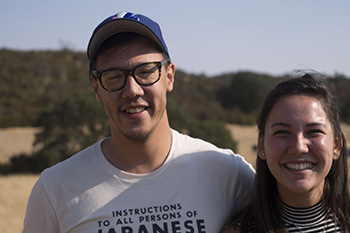 Through lyrics and music (listen) they are sharing the historical narratives of the Japanese-American incarceration. Before coming to Brown, Julian Saporiti sang for a touring folk band. Now he’s working on a multimedia dissertation about Japanese-American incarceration during World War II, a project timely to the 75th anniversary of this era of American history. Saporiti has interviewed nearly 30 Americans who were interned at camps in Wyoming, Idaho, California, Arizona, Utah, Arkansas and Colorado. He has turned their stories into lyrics, which he performs alongside Aoyama and musician Kishi Bashi. Black and white images shared by internees create a backdrop for their performances.
Through lyrics and music (listen) they are sharing the historical narratives of the Japanese-American incarceration. Before coming to Brown, Julian Saporiti sang for a touring folk band. Now he’s working on a multimedia dissertation about Japanese-American incarceration during World War II, a project timely to the 75th anniversary of this era of American history. Saporiti has interviewed nearly 30 Americans who were interned at camps in Wyoming, Idaho, California, Arizona, Utah, Arkansas and Colorado. He has turned their stories into lyrics, which he performs alongside Aoyama and musician Kishi Bashi. Black and white images shared by internees create a backdrop for their performances.
“Visuals can do more than I can explain. They work with our music to fill in the gaps and they evoke a really visceral, emotional reaction,” says Saporiti.
This week Saporiti and Aoyama will be performing in Heart Mountain, Wyoming at the former barracks of one of the incarceration camps. They will draw an audience that is likely not Asian American nor who know much about the camps, but who will learn through the music about this history. Both students have been performing at schools and venues across the country, along with Kishi Bashi. They often hold Q & A sessions after the shows to talk about the history and current day parallels.
There are many aspects of the student’s research that is unique. He and Aoyama are part of a cohort of eight graduate students in four different departments at Brown who are interested in Japanese and/or Asian American history. The cohort conducted a two-week mobile workshop/research trip, led by American Studies student Nicole Sintetos, and visited internment camps from Phoenix, Arizona, to Bainbridge Island, Washington. The project was entitled JAIN (Japanese American Incarceration). “Each stop incorporated music, which added so much and gave us another way to see and think about the history,” says Saporiti.
Saporiti, Aoyama and Sintetos joined with other doctoral students Megan Bourgeois (Political Science), Diego Luis (History), Takuya Maeda (History), Mallory Matsumoto (Anthropology), and Yoon Kyung Shim (Anthropology) for the workshop, as well as Kishi Bashi. The cross-program collaboration has helped the students each think about their research in ways they may not have in a stand-alone program or without a multimedia approach. As an example, Sintetos has been able to use much of the research to add to curriculum she’s developing with fellow American Studies PhD student, Suzanne Enzerink, and elicit feedback from the group. Their work will be published through Brown University's Choices Program at the Watson Institute.
"The workshop experience, for me, was a unique way to get to know the community of scholars and other folks connected to, in one way or another, the Japanese American experience during World War II. More importantly, though, the two weeks on the road created a community amongst the graduate students that has continued to grow on campus. This cross-disciplinary and collaborative community has had a huge impact on my first semester, both in and out of the classroom, and I know will only continue to influence and improve my future scholarship," says Aoyama.
Funding for the workshop came from individual departments, as well as the Cogut Institute for the Humanities, Graduate Student Council, Graduate School, and through ticket sales from performances. “Brown is the only place I could do this,” says Saporiti.
Their participation is very personal, Aoyama’s grandmother was held at the Heart Mountain camp. She explains that her family didn’t discuss it growing up, but being two generations removed has given her the space to explore this connection, which her history books in high school only dedicated a paragraph. Saporiti also draws parallels to his Vietnamese-American refugee history.
Aoyama is a first year student who hopes to study the Japanese American experience within the broader context of American racial history, beginning in the early 19th century and continuing throughout the Civil Rights Movement and the Vietnam War era. Both stressed the connections they are trying to make with what happened to Japanese Americans in the 1940s to how Muslims are treated today and the mass incarceration of African Americans.
The message they wish to convey from the internment camp survivors, is, please, “don’t let this happen again.”